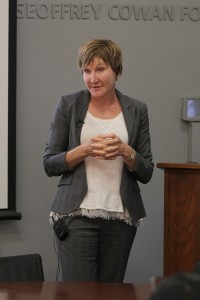Professor creates Twitter support groups for smokers
USC Annenberg School for Communication and Journalism hosted “How to Build Online Communities: Initial Findings,” a presentation by Cornelia Pechmann, Wednesday afternoon in the Geoffrey Cowan Forum.

Smoking kills · Professor Cornelia Pechmann speaks to students and faculty about anti-smoking campaigns on Wednesday afternoon. – Corey Marquetti | Daily Trojan
Pechmann is a professor of marketing at the Paul Merage School of Business at the University of California, Irvine. She has received nearly $1.5 million in grants to study anti-smoking advertising and adolescents. Pechmann also assists the White House Office of National Drug Control Policy in overseeing a multi-year, anti-drug advertising campaign.
Pechmann discussed different types of “big data” and the differences between macrotargeting and large-scale microtargeting. She also applied her marketing and data perspective to online communities and spoke about how online communities are used by social media, health groups, the government, nonprofits, firms, brand and user groups and sports and affinity groups.
Pechmann said that online communities are unique because of their small participant size and the limited duration of most online conversations.
“My goal was to help governments, nonprofits and forums to create engaging online communities to help people quit smoking,” Pechmann said.
Pechmann proceeded to talk about how she created online Twitter communities as support groups to help people quit smoking. She described a setup of how she would test out communities of different sizes. Pechmann said she eventually discovered that a support group of approximately 25 people was the most effective at retaining members of the group.
“Online communities are such a huge part of our lives so having a role model in an online community can be beneficial to smokers,” said Ha-Rim Choi, a sophomore majoring in business administration who attended the event.
Pechmann also discussed how creating automated messages to facilitate discussion was an extremely effective and cost-efficient method to drastically increase the retention rates of a support group on Twitter for the three month trial times of each testing period.
“I think the idea definitely has potential because of how attached we are to social media and online communities,” said Albert Yue, a freshman majoring in computer science (games). “However, not having the physical connection or communication that traditional support groups provide is definitely a challenge that needs to be addressed. I think if this was used to supplement traditional support groups it could be very powerful.”
Pechmann expressed the difficulty in finding the “holy grail” of online communities, where community members were engaged and formed relationships that lasted longer than the length of the conversation itself. Students had mixed opinions on this idea.
“I don’t think that it would help as much as people meeting together in person, because tweeting is so passive and isn’t a really dominant aspect of people’s lives,” said Elliot Kim, a freshman majoring in economics.
Many students, however, still said they believe that Pechmann has an innovative idea that could definitely be expanded into something more.
“It sounds like it would be really cool,” said William Anderson, a freshman majoring in game design and interactive media. “Support groups like that tend to work well since people can talk about stuff without actually having the pressure admitting their problem to someone in person.”
